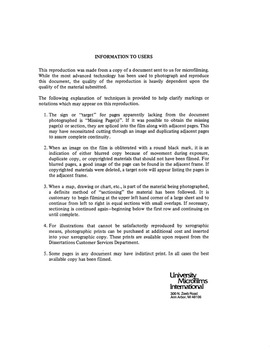| dc.contributor.author | Parker, Dennis Keith, | en_US |
| dc.date.accessioned | 2013-08-16T12:29:22Z | |
| dc.date.available | 2013-08-16T12:29:22Z | |
| dc.date.issued | 1985 | en_US |
| dc.identifier.uri | https://hdl.handle.net/11244/5347 | |
| dc.description.abstract | Conclusions. The results of this study support the view that a treatment consisting of more than one type of test-like events may be the best overall strategy for a Calculus I lecture. However, the long-term effect on achievement may not be of great educational significance. In addition, the prior knowledge of Calculus I students has little influence on the effectiveness of a test-like events treatment. | en_US |
| dc.description.abstract | Results. A Hotelling-Lawley trace 3 x 2 (treatment x prior knowledge) MANOVA test revealed an overall treatment effect (p < .05) and no overall treatment x prior knowledge interaction effect. Three of the eight univariate ANOVA tests revealed significant treatment effects--all three on measurements of concept/principle learning. Newman-Keuls pairwise comparisons showed that the both question type group significantly outperformed the skill only group on three measurements of concept/principle learning and significantly outperformed the control group on one measurement of concept-principle learning. | en_US |
| dc.description.abstract | Procedure. Three sections of Calculus I served as treatment groups. Students in the control group received no test-like events. Students in one experimental group received only skill level test-like events. Students in a second experimental group received both skill and concept/principle level test-like events. A correct response to each test-like event was given by the instructor following time given to the students to make overt written responses. The treatment lasted fifteen weeks and was interspersed with four criterion tests, each composed of a measurement of skill level learning and one of concept/principle learning. | en_US |
| dc.description.abstract | Purpose. This study investigated the effectiveness of test-like events during lecture in the facilitation of learning mathematics. The basis of the study was that test-like events may affect one or more aspects of attention including length, intensity, type (selective or nonselective) and direction (backward or forward), depending on the type of test-like events, type of learning outcome measured, and learner characteristics. Support for this framework was provided by the literature on analogous studies that investigated the effect of test-like events in text, electronic student response systems, and general classroom questioning. | en_US |
| dc.format.extent | vi, 109 leaves : | en_US |
| dc.publisher | The University of Oklahoma. | en_US |
| dc.subject | Education, Mathematics. | en_US |
| dc.subject | Lectures and lecturing. | en_US |
| dc.subject | Attention. | en_US |
| dc.title | The effect of test-like events during mathematics lecture / | en_US |
| dc.type | Thesis | en_US |
| dc.thesis.degree | Ph.D. | en_US |
| dc.note | Source: Dissertation Abstracts International, Volume: 46-08, Section: A, page: 2221. | en_US |
| ou.identifier | (UMI)AAI8523096 | en_US |
| ou.group | Jeannine Rainbolt College of Education | |
